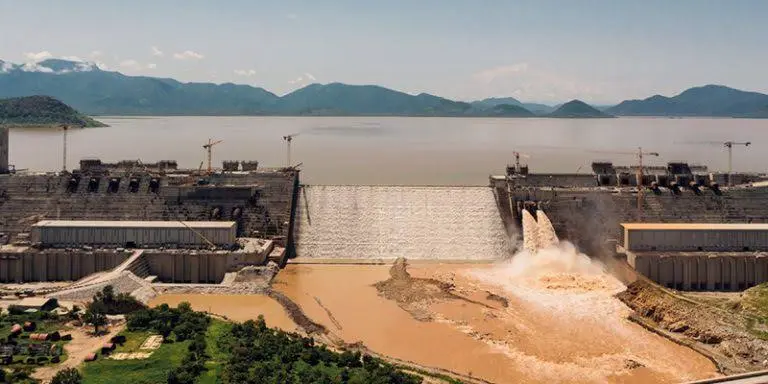Ethiopia’s Grand Renaissance dam nears full completion at 98.66%

Ethiopia’s massive hydroelectric dam project on the Blue Nile is now 98.66% complete with six power units already operational, officials announced on Saturday.
The update on the Grand Ethiopian Renaissance Dam (GERD) came during a cabinet meeting led by Prime Minister Abiy Ahmed, who has championed the project as vital to the nation’s development.
According to a statement from the Prime Minister’s Office, the government considers the GERD “one of the most important strategic infrastructure projects in the country” that will significantly boost Ethiopia’s electricity generation and enable energy exports to neighbouring countries.
Ahmed told parliament in March that a ribbon-cutting ceremony would take place within six months, marking a “historic event” at the beginning of the Ethiopian new year in September.
The dam, set to become Africa’s largest hydroelectric facility with over 5,000 megawatts of generating capacity when finished, has been generating power since February 2022. But its progress has fuelled a decade-long dispute with downstream nations Egypt and Sudan.
Cairo and Khartoum continue to demand a binding agreement on the dam’s filling and operation before Ethiopia completes the project. Both nations fear the massive reservoir, which will hold 74 billion cubic metres of water when full, could dramatically reduce their Nile water supply during filling periods and drought years.
Egypt, which relies on the Nile for more than 90% of its freshwater and considers it a matter of national security, could lose up to 10 billion cubic metres of water annually during reservoir filling. This potential reduction comes as Egypt already faces water scarcity levels below international poverty thresholds.
“Any significant reduction in water flow could devastate our agriculture sector and affect drinking water supplies for millions,” an Egyptian water official told this newspaper last month, speaking on condition of anonymity.
Ethiopia, meanwhile, insists the project won’t cause significant harm to its downstream neighbours. Officials in Addis Ababa argue the dam will actually benefit the region by regulating water flow, preventing floods and reducing siltation.
For Ethiopia, where more than half the population lacks electricity access, the dam represents both development hopes and national pride. The $4.8 billion project has been largely self-funded through government bonds and citizen contributions.
February saw Egypt and Sudan issue a joint statement following meetings between their foreign and irrigation ministers, emphasising that water security between the two countries is “an indivisible part of their shared interests” and characterising the dam as “a problem between Egypt, Sudan, and Ethiopia” that shouldn’t involve other Nile basin countries.
While both downstream nations affirmed their commitment to peaceful solutions, they called on all parties to “refrain from any unilateral actions that could harm their water interests.”
International mediation efforts by the African Union, United States and World Bank have thus far failed to broker a comprehensive agreement. As Ethiopia approaches the project’s completion, diplomatic pressure is mounting, though analysts say Addis Ababa’s position has strengthened as the dam becomes an increasingly irreversible reality.
“At this stage, with the dam nearly finished, negotiations are shifting from whether it will be built to how it will be operated,” said Lama Al-Hajj, a water security expert at the Middle East Institute. “Egypt and Sudan are now focused on securing guarantees for water releases during drought periods.”
The next few months will be critical as Ethiopia finalises construction and prepares for the official inauguration, while downstream nations continue pressing for operational safeguards that would protect their water supply for generations to come.
How to submit an Op-Ed: Libyan Express accepts opinion articles on a wide range of topics. Submissions may be sent to oped@libyanexpress.com. Please include ‘Op-Ed’ in the subject line.
- Tunisia reports marked growth in exports to Libya - April 25, 2025
- Libya’s central bank governor meets with J.P. Morgan - April 25, 2025
- Libya settles Arab League dues - April 24, 2025


